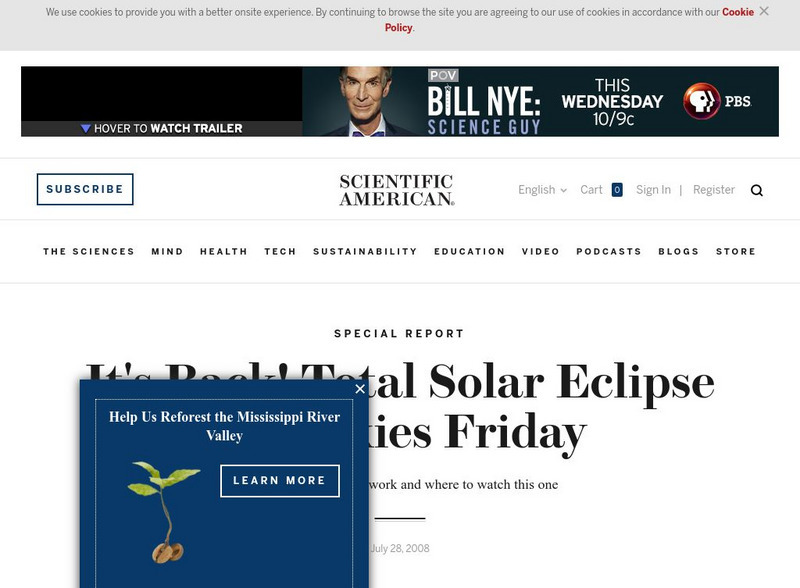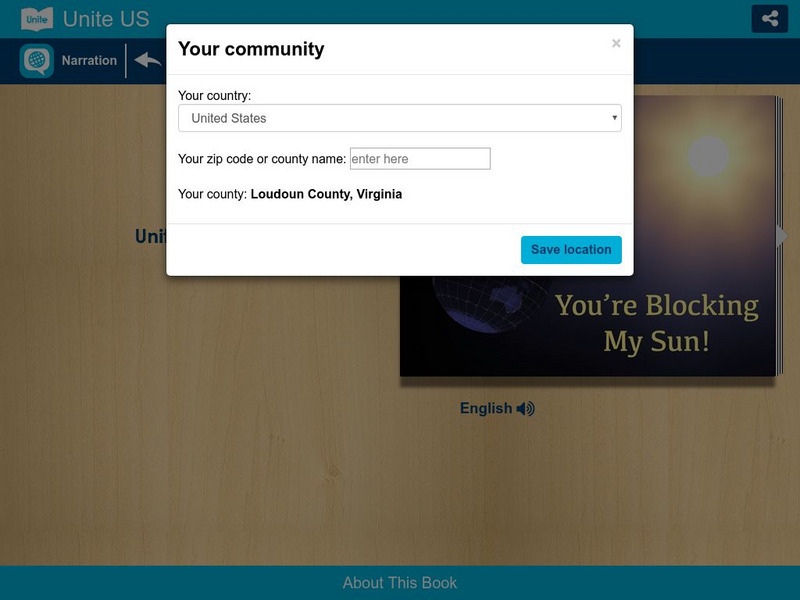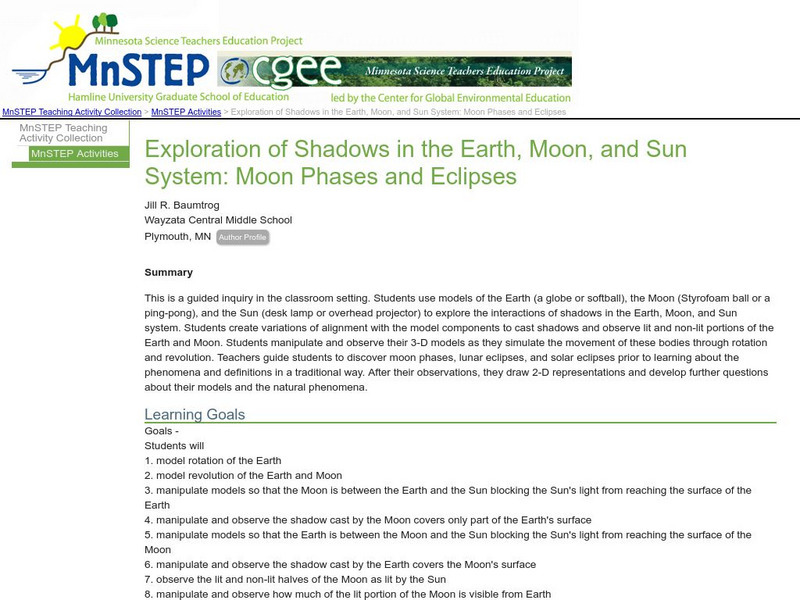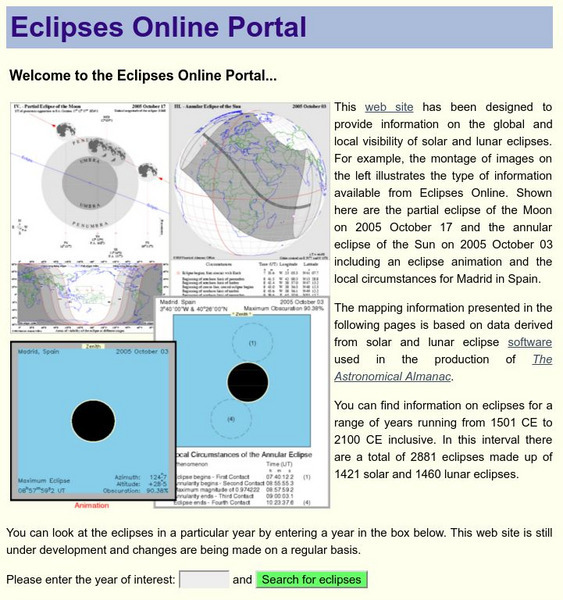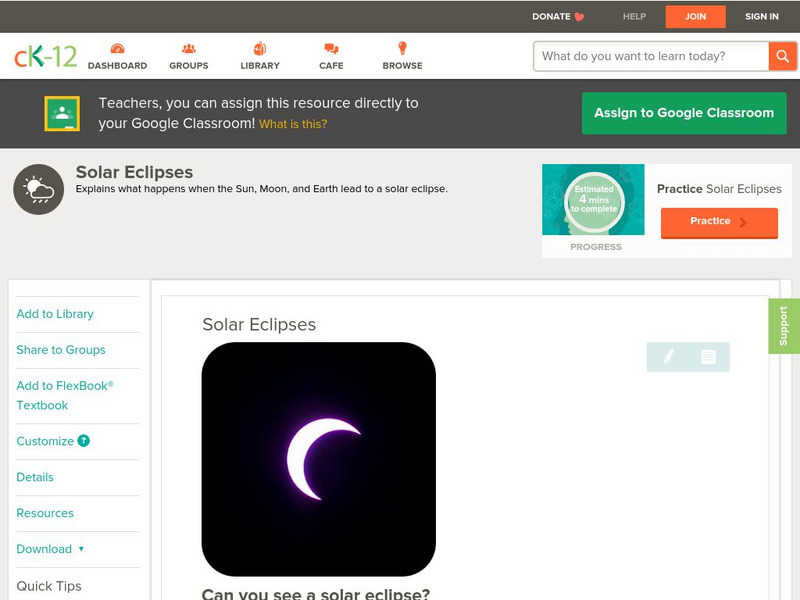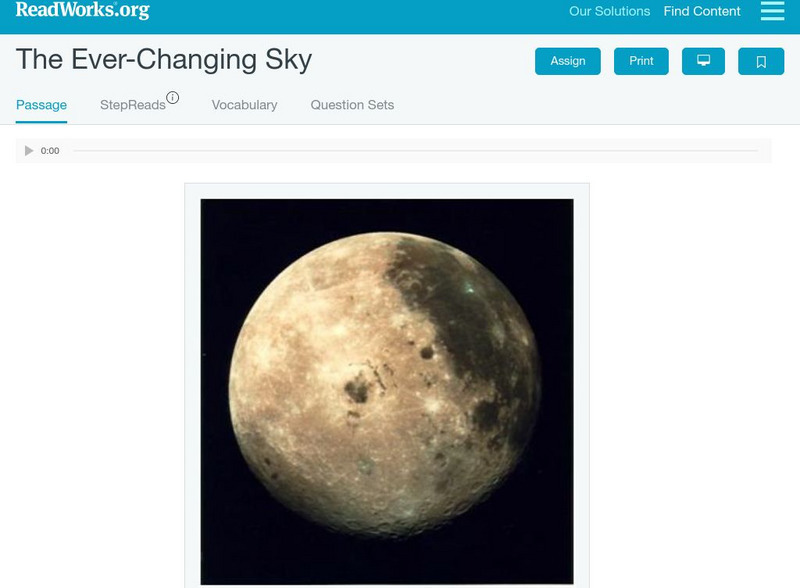NASA
Nasa: Solar and Lunar Eclipses
Information on solar and lunar eclipses for current year as well as past and future.
Exploratorium
Exploratorium: Total Solar Eclipse July 22, 2009
Watch webcast coverage of a total eclipse of the sun. Slideshows and animations explain how this exceptional space event takes place.
Scientific American
Scientific American: It's Back! Total Solar Eclipse Hits Skies
Discover information about the solar eclipse of the moon cutting between the Earth and the Sun in July 2008. [July 2008]
Georgia Department of Education
Ga Virtual Learning: The Moon
In this interactive tutorial students will explore what it is like on the Moon. Learn why the shape of the Moon seem to change and also about lunar eclipses. Discover why the tide changes twice a day and explore how the cycle of the Moon...
NASA
Goddard Education: Eclipse 99
Information is provided about the eclipse of 1999; in addition, facts about elcipses throughout history are also included.
NASA
Nasa: The Space Place
Do you know what a solar eclipse is? Or how about a galaxy? Space Place has the answers to all your questions about space! Site includes information to explore about planets, satellites, moons, and much more. Also on the website are...
Exploratorium
Exploratorium: Total Solar Eclipse
This site provides detailed information about solar eclipses, including what to watch for and how to view an eclipse, why an eclipse occurs, and various feature stories.
Unite for Literacy
Unite for Literacy: Hey Moon, You're Blocking My Sun!
Learn the science behind what happens during a solar eclipse. Includes audio accompaniment as well as an animation.
CommonLit
Common Lit: "What Is an Eclipse?" by Nasa
CommonLit.org is a wonderful resource to use in a Language Arts classroom. Each story or article is accompanied by guided reading questions, assessment questions, and discussion questions. In addition, students can click on words to see...
National Geographic
National Geographic: Build a Solar Eclipse Viewer
This lesson focuses on How can you safely view a solar eclipse and solar activity? It provides step-by-step instructions for building the viewer and how to use it properly. It also provides a video and informational slides.
Cosmos 4 kids
Cosmos4 Kids: Systems: Eclipses
Find out about the differences between solar and lunar eclipses and what causes both events to occur.
Exploratorium
Exploratorium: Eclipse 2001 the View From Zambia
On Thursday, June 21, 2001, a total solar eclipse sped across the Southern Hemisphere, and this site has highlights of the eclipse captured on tape.
Science Education Resource Center at Carleton College
Serc: Exploration of Shadows: Earth, Moon, Sun System: Moon Phases Eclipses
A guided inquiry where students participate in the simulation of moon phases and eclipses.
Other
Eclipses Online: Solar & Lunar Eclipses
This resource explores both solar and lunar eclipses from the past, the present, and the future. It gives detailed explanations to where the eclipse was and when it will happen again. Enter a year in the search box to find eclipse...
Other
Eclipses Online
This resource explores both solar and lunar eclipses from the past, the present, and the future. It gives detailed explanations to where the eclipse was and when it will happen again. Enter a year in the search box to find information...
NASA
Nasa: Central Solar Eclipse Paths: 1991 2050
Resource provides links to maps and path coordinates for every solar eclipse from 1991 through 2050.
Scholastic
Scholastic: Study Jams! Science: Our Solar System: The Moon
A slideshow and a short multiple-choice quiz on the moon. It discusses the moon's phases, its rotation, and characteristics of the moon.
NASA
Nasa: Eye Safety During Solar Eclipses
This resource, which is provided for by NASA, gives great information on protecting your eyes during solar eclipses. Your eyes are very difficult to replace. Even when 99% of the Sun's surface is obscured during the partial phases of a...
NASA
Nasa: Space Place: Venus Crosses the Sun
Animations, videos, and informational text illustrating the natural phenomena of different types of eclipses.
CK-12 Foundation
Ck 12: Earth Science: Solar Eclipses
[Free Registration/Login may be required to access all resource tools.] Find out how solar eclipses occur.
NASA
Nasa: Imagine the Universe: The Sun
Site discusses the regions of the Sun's atmosphere such as the Photosphere, Chromosphere, and Corona. Provides sources for educators as well as additional links for students.
Read Works
Read Works: The Ever Changing Sky
[Free Registration/Login Required] This informational text passage shares observable aspects of the sun and the moon. This passage is a stand-alone curricular piece that reinforces essential reading skills and strategies and establishes...
Read Works
Read Works: Partial Eclipse
[Free Registration/Login Required] A literary text about a boy named Marcus who wanted to learn about and watch an eclipse. A question sheet is available to help students build skills in reading comprehension.
CK-12 Foundation
Ck 12: Plix: Eclipses
[Free Registration/Login Required] An animation and short quiz about eclipses.




